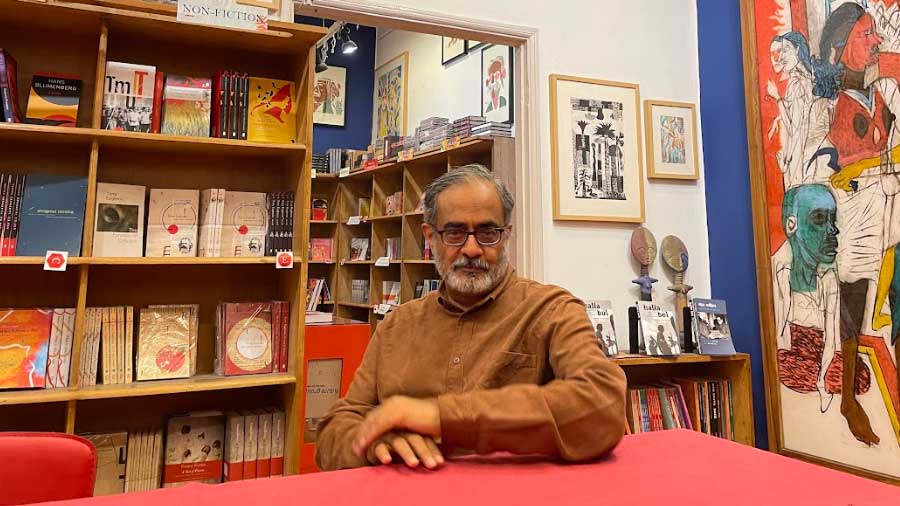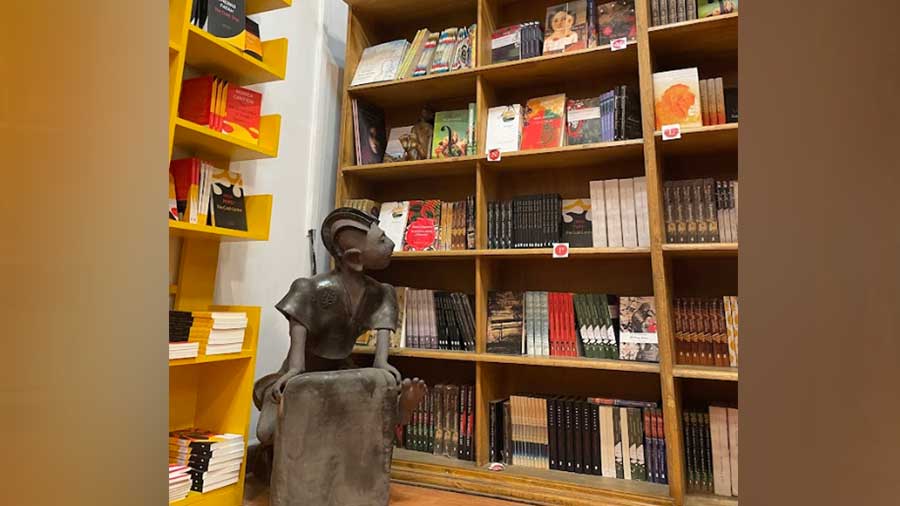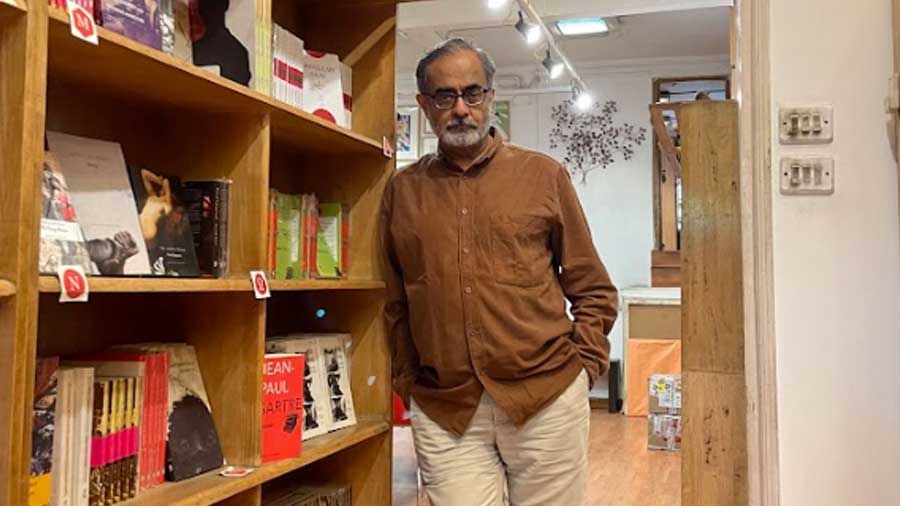In 2005, Naveen Kishore, the publisher of Seagull Books, was escorting Mahasweta Devi to Italy where she was receiving an award. Naveen — as we all know him — spent a day in Venice with one of the other awardees, a Chinese writer who spoke no English and his daughter. Naveen sent him some black-and-white photographs he had taken of their day together. Years later while doing a series on Communism, he reached out to that Chinese writer because he knew no one else in China. Then Naveen acquired the rights for his novel Pow!. The writer was Mo Yan and as Pow! was about to be published, he won the Nobel Prize for literature.
The story is quintessentially Seagull because it’s a publishing house that’s based on human contact above everything else. It’s that human contact that made Mrinal Sen give Seagull the script for Akaler Sandhaney even before Naveen had finished his pitch. That script persuaded film historian Jay Leyda to trust Seagull with the world rights to Sergei Eisenstein’s autobiography. And the ball keeps rolling.
Seagull started out in 1982 as a publisher of books about theatre because Naveen noticed someone feverishly sketching the exercises during a Badal Sircar theatre workshop. Now its list includes Gayatri Spivak, William Kentridge, Ngũgĩ wa Thiong’o. It’s part of an audacious statement that says great world literature does not have to come out of New York or London; it can emerge from an office in Bhowanipore, Kolkata, where KG Subramanyan artworks rub shoulders with Tintin and wooden hornbills.
Naveen’s own background was in theatre. He started out as the assistant props person for the theatre group Red Curtain’s production of Wait Until Dark. He worked advertising jobs, producing Birju Maharaj and Begum Akhtar concerts, and Wills Made For Each Other events with a 40-foot blue sky and stars on a dimmer. When he won the Goethe medal in 2013, German publisher Elizabeth Ruge called him a “bricoleur” — a magpie of the letters, who audaciously “brings together all those texts he perceives as glittering, often uniting books and authors that, at first glance don’t relate to each other.”
This year Naveen Kishore just won the Words Without Borders Ottoway Award for the Promotion of International Literature. In a city that is forever lamenting its lost cosmopolitanism, Seagull remains effortlessly international. Some think of Seagull as part of Kolkata’s cultural DNA. Others think of it as the city’s best-kept secret. Yet others, Naveen once said, wonder what a Punjabi man was doing starting a publishing house in Kolkata. “When people say are you a Bengali, I say I am a Calcuttan,” he quips. And that means being as much at home with Mahasweta Devi and Chapal Bhaduri as with Benedict Anderson and Yves Bonnefoy. As Jeff Deustch, director of the Seminary Co-op bookstores in Chicago, said while kicking off the Ottoway Award celebrations, “Being decidedly of a particular place is a profound way to be global.”
Here are edited excerpts from a conversation with Naveen Kishore.

Naveen Kishore at Seagull Bookstore in Bhowanipore Gurmehar Kaur
SANDIP ROY: Does the timing strike you as a bit curious that you are getting an award from Words Without Borders at this moment when we seem more conscious about borders than ever before, trying to keep a virus out.
NAVEEN KISHORE: I think the timing is more ironic than curious. But it also links to my one pet peeve that has remained since 2005 when we decided to play first world publishers in a third world currency in a sense, which is what we did when we set up a Seagull Books London imprint. You knew immediately that your location was making the difference of breaking boundaries. Otherwise when you were owning the world rights for something like Tarkovsky’s Diaries and you were trying to sell it to a U.S. publisher they couldn’t understand how is it that you were sitting in Kolkata publishing these Eisensteins and Pudovkins.
What is the relationship between Seagull and Kolkata? Many international writers have said they came to Kolkata because they wanted to visit Seagull.
NK: It’s partly birth and circumstance. But Kolkata, even though some of it now has become a bit of an echo chamber, has always been a far more hospitable city. You still walk in without appointments. You still share your meals even in your working lives. The attraction to Seagull as a physical, architectural and inhabited space is also because it is a bit of an oasis. It’s never been an exclusionary space. The space has a retrospective logic in the way it’s shaped physically, design wise, object wise, art wise. Like our backlist or what I like to call our wish list. There cannot be a master plan for this list. It is not a strategy, except retrospectively. It’s always when you look back that you then piece it together.
We’re often dismissed as eccentric because of the choices we make or people think we have some magical formula because how could anybody sell these books and survive, right? It’s like the city. It’s a chaotic thing we are all in. But if I had the luxury of also working out of somewhere else, I would want to be in Berlin. Are the Germans reading this?

The attraction to Seagull as a physical, architectural and inhabited space is also because it is a bit of an oasis, says Naveen Kishore Gurmehar Kaur
Do you think a city like Kolkata has been able to make Seagull its own?
NK: Every time we shifted location people used to think we had shut down and almost sounded gleeful. There are people I meet who say, “Oh, but not enough people know about you and I really want to help you to get known”. Do I want that? After 40 years of surviving as a publisher and 50 years, exactly next year, of surviving in the arts, I am a part of the city’s cultural life.
Many of my friends moved to better lives elsewhere. People ask me “tumi ekhaney thekey geley? (you remained behind)”. Sometimes it takes 40 years for the world to reach out, which it does. I foolishly believe there is a kind of duty the city has to find you on its own. If somebody was offering me a Naipaul event at a star hotel or wherever, I would say no because I have a bookstore and that’s where the event should happen. It’s not arrogance. It’s just the way it is.
What do you think gives a city its character?
NK: The publishing reality has shifted to Delhi, which is a political reality, everybody needs to be there. But there is a certain openness (in Kolkata) which no amount of dark times is going to get rid of. A certain kind of curiosity despite the exhaustion. Tiredness is not a problem but the exhaustion worries me and it’s been exhausted for the last 20 years.
This is a time when many feel that the space of what you can say is shrinking. Do you feel its effect as a publisher?
NK: Many years ago I got rid of the obscenity/libel clause in our contracts because I said if you’re taking on a book, you have to protect it together against any court cases. You do not sit back and let the author deal with it. You have to be willing to stand up and be counted even if you are not a great rabble-rouser on the streets. But yes, it affects me because it’s around me. I have these photographs I took 20 years ago post-Gujarat (riots). I don’t think a single gallery can show them in the current climate. When you’re distributing a Romila Thapar book with a major publisher they want the legal department to see the content of a 150-page book and remove certain words.
What about the impact of something like ‘cancel culture’?
NK: Supposing I have a book where there are two authors and one of them gets called out for a #MeToo type situation. When it’s happening to another publisher, I can be strident. But when it's happening to me, how do I balance the 2,000 copies I’ve just printed off? On the other hand let’s say we’ve spent thousands of pounds commissioning a book by someone I’ve grown up reading. I don’t know the content of what he writes because it’s in French. Then it turns out to be rabidly Islamophobic. The man has changed. You have to forfeit your advances to the French publisher, the translator and say sorry. It has to be on an individual case basis, not a blanket attack.

The most surprising thing that Seagull has given Naveen is ‘the tangible’ Gurmehar Kaur
What’s the most surprising thing Seagull has given you?
NK: The tangible. I remember 1982-83 when the first book came out, Richard Schechner’s Performative Circumstances — From the Avantgarde to Ramlila. I held it in my hand and thought this is going to change the course of what I do. I was a theatre lighting person and theatre is very ephemeral — the excitement of the opening night and then the downer of the emptying of the theatre. The book was something that would last physically. And beyond the object, the content. If we’ve survived for 40 years, it’s because the content has sustainability. The money is desperately essential but it is secondary.
What happens with Seagull at 40 next year?
NK: Next year we are starting Seagull audiobooks. We don’t want to do anything loud and self-congratulatory. Over a year and half, starting next fall, we are putting together a small imprint within the list — Seagull at 40. There will be some wonderful names — perhaps something from a Mahasweta that has never been published and a bunch of letters from Rilke to very important people. Seagull at 40 is about affirming the word.
Was the aesthetic of the book always important to you?
NK: From day one. It was totally the theatre aesthetics. I was good with spaces, about making spaces look good. Now the space was the book. When we started doing it, books from India were very suspect — binding, printing, everything. I used the same resources that Oxford University Press or Orient Longman did. But I was lucky because I fell into the hands of the master printer P.K. Ghosh of Eastend Press. We were printer-led. We had better looking books because of the grammage of the paper, we used the best weight of paper.
What’s the first book you picked up that looked so beautiful you wanted to read it?
NK: I can tell you specifically. It happened in Kharagpur. It happened with the cousin who weaned me from science to literature. He had the most amazing three volumes of Paradise Lost, the usual gilt edge, all of which have now become iconic. More importantly, he had all the first editions of P.G. Wodehouse. He still has them, but the damn man is no longer around. And that. one misses.